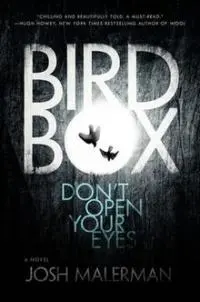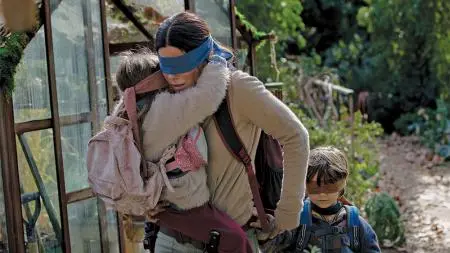Josh Malerman's novel Bird Box sent nearly instant ripples through the literary community upon its publication in 2014, with fans and critics alike touting it as one of the finest horror books of the 21st century. It received nominations for the James Herbert Award and the Bram Stoker Award for best debut novel, while Publisher's Weekly even compared Malerman to Stephen King, with several other reviews echoing the sentiment.
With such accolades and fervor surrounding the book, a film adaptation naturally got underway. It took four years for Bird Box to see the light of day, arriving in the form of a Netflix original film that also played in select theaters around the country. Early reviews have been mixed, with some critics claiming the film is nothing more than A Quiet Place knockoff—a faulty argument because, one, Malerman's book came out well before A Quiet Place hit screens in 2018, and two, besides the obvious parallels of mysterious creatures, using sensory elements as a vehicle for terror, and terrifying birthing scenes, the two narratives have very little in common. The aforementioned King, moreover, believes the negative reviews had more to do with streaming platform snobbery than the film's merits, of which he insists are plentiful.
At least in this writer's opinion, King's assessment is correct: Bird Box as a film is taut, tense, emotionally rich, and psychologically dense. Compared to Malerman's novel, it stands on its own, a decidedly visual and aural experience, as cinema should be; it's not quite spectacle, though a particularly knuckle-biting action sequence near the beginning of the film dips its toes into spectacular waters (and this is not a criticism, mind you).
Plot-wise, the film is virtually identical to its literary counterpart, beginning with a woman sternly, even militantly, outlining what seems tantamount to a suicide mission to a boy and girl. We further learn that this is all the woman, Mallory (played superbly by Sandra Bullock) calls the five-year-olds—Boy and Girl—and that they must brave a dangerous journey on an old rowboat down a river, in the hopes of making it to a sanctuary stocked with people and enough food and supplies to last for years. The biggest caveat here is that Mallory and the children must make this risky trek while blindfolded, as there are strange monsters lurking outside that drive people to insanity just by looking at them.
SPOILER ALERT!
Flashbacks reveal the onset of this apocalypse-inducing epidemic, explaining how Mallory came to be the hard-lined captain of this potentially (read: very likely) deadly voyage. We learn that Mallory became pregnant after a fling with her roommate, who afterwards vanished from her life, and though she plans to birth the child, seriously considers giving him or her up for adoption; however, her sister Jessica (the always engaging Sarah Paulson) seems convinced Mallory will eventually fall in love with her child.
 Jessica unfortunately doesn't get the chance to find out if her prediction will come true: as they leave the hospital following a routine checkup for Mallory, the epidemic hits their city like a nuclear blast, and to put it scientifically, the entire community loses its shit. This includes Jessica, who, while driving Mallory back to her home, sees one of the invading creatures and intentionally wrecks her vehicle; both survive the crash, but Jessica walks into the path of a speeding garbage truck, providing one of the film's gorier moments.
Jessica unfortunately doesn't get the chance to find out if her prediction will come true: as they leave the hospital following a routine checkup for Mallory, the epidemic hits their city like a nuclear blast, and to put it scientifically, the entire community loses its shit. This includes Jessica, who, while driving Mallory back to her home, sees one of the invading creatures and intentionally wrecks her vehicle; both survive the crash, but Jessica walks into the path of a speeding garbage truck, providing one of the film's gorier moments.
Following this, Mallory stumbles into the nearby home of Greg (B.D. Wong), who has invited several of his neighbors in to weather out the apocalypse (at least temporarily). This gang includes Tom (Trevante Rhodes), an ex-soldier turned construction worker who provides tacit leadership and a moral compass for the band of survivors as the narrative proceeds (he's also a love interest for Mallory) and Douglas (John Malkovich) an alcoholic and self-described asshole who spouts light Trumpisms and cares only for his own survival. There is a host of others that don't necessarily need mentioning, not because they're unimportant gore fodder (though there is much more bloodshed to follow), but because we simply don't have the time to list them all out and discuss their various character traits here. They're not all exactly the same as their book counterparts, but they work well in this cinematic landscape.
As the days eclipse into weeks, another pregnant woman, Olympia (Danielle Macdonald), joins the group, followed not long after by Gary (Tom Hollander), whose arrival ultimately spells doom for the survivors: he is one of many characters in the narrative who have seen the monsters and not instantly offed themselves (what separates these people from the rest of the population, we do not know, though it's suggested certain mental conditions provide a layer of "protection" that causes madness but not suicidal tendencies). Gary further believes that the monsters have arrived to cleanse the Earth, that seeing them in all their glory is "beautiful," even if the sight of them leads to death. He sets about removing all the protections the survivors have placed around the house—he rips newspapers from the windows, lifts blinds, open doors, all so that the monsters may come into the home and reveal themselves. This act coincides with Mallory and Olympia going into labor at the same time, with Gary especially insistent upon making their newborn infants gaze upon the creatures. While this does not occur, Olympia sees one of the entities and hurls herself out of an upstairs window. Mallory protects both babies while Gary scuffles first with Douglas then Tom—the former dies by Gary's hand, while the latter manages to blow him away with a shotgun.
Here, the film makes its most impactful departure from Malerman's work. In the novel, Tom also dies and Gary escapes the house, leaving Mallory all alone. She relocates and begins training the children how to survive this new world. She treats her son no differently from Olympia's daughter; they are both, effectively, her kids, but her love is tough, even abrasive at times. She does not name them for the sheer fact that names are a luxury in this harsh, death-suffused world. If Mallory does not prepare them, if she doesn't ensure they have the tools to make it, then, quite simply, they won't. Her treatment of the kids comes across as cold, even shocking at times, but we understand the behavior, even if we may not entirely agree with it. It's her responsibility to raise these children, to ensure their survival; if she fails them, she believes, their deaths will be on her hands. Moreover, if they die, she will have lost everyone and everything she ever held dear, and this loss might be too much, in the end, for Mallory to bear.
The character's behavior and motivations in the film are identical to the book, but with Tom at her side as a partner and de facto father to the children for the first five years of their lives, it seems less likely Mallory would be as hard on Boy and Girl as she is, especially with Tom's kinder, gentler approach to all things. This matter is indeed addressed within the film, as Mallory and Tom have an argument about giving the children any false senses of hope, and Tom even chastises her for having not given them proper names. Dramatically speaking, this moment works in terms of establishing the climax, in which Mallory finally softens some of her parenting skills in order to better gain the trust of Girl, who is often terrified of her pseudo-mother, but it also feels a bit unrealistic that this argument would not have occurred much earlier in the children's lives. Mallory and Tom have more or less been living as a married couple all this time, and despite the outside threats, they seem to be fairly comfortable and overall safe. Again, if Mallory were all alone, as she is the novel, her militant raising of the children would make more sense; but with Tom's influence there the entire time, it isn't as emotionally effective.
But this is the film's only real flaw, and it pales in comparison to its achievements. Director Susanne Bier and screenwriter Eric Heisserer speak the language of cinema well, turning Malerman's slightly more introspective work into a horror thriller with very little downtime. The sequence of chaos that properly introduces the creatures and their mind-altering abilities is one of the best of the apocalyptic sub-genre, and casting the popular and recognizable Sarah Paulson, only to kill her character off in brutal fashion within the first half-hour, is a classic familiar-face-misdirect in the tradition of Psycho and Scream. Even if you've read the novel and know that Mallory's sister succumbs to the monsters, the scene is nonetheless an effective shocker that makes you wonder who among the impeccable cast might be next.
The film's finest achievement, however is its refusal to actually show the monsters. Reportedly, producers attempted to force Heisserer and Bier to reveal them at one point in the film, but thankfully, the scene was cut. Instead, all we ever see of them are vague shadows and leaves that suddenly defy gravity whenever the monsters are near; there are also Gary's sketches, which he lays out on a coffee table just prior to opening the house up for the creatures to enter, but if you look closely, each sketch differs from the last, leading us to believe they're either constantly shapeshifting, or Gary's perception of the monsters isn't altogether reliable (the latter scenario is more likely, given his madness). Malerman never shows us the creatures either, and this is crucial to a narrative that hinges on characters completely losing their minds upon even the briefest glimpse of these entities. Nothing created in a special effects shop or on a computer could be as terrifying as what the viewer's mind will conjure, and thus, to show the creatures would be a major detriment to the narrative. Kudos to Bier and Heisserer for sticking to their guns and keeping the monsters out of sight.
Overall, Bird Box is a fine novel adaptation and a solid entry not only to the great horror films of 2018, but of the larger apocalyptic subgenre. Hopefully, it will make household names of Beir, Heisserer, and Malerman, in the same way Brian De Palma's Carrie helped to skyrocket Stephen King into his Master of Horror status.
Get Bird Box at Bookshop or Amazon

About the author
Christopher Shultz writes plays and fiction. His works have appeared at The Inkwell Theatre's Playwrights' Night, and in Pseudopod, Unnerving Magazine, Apex Magazine, freeze frame flash fiction and Grievous Angel, among other places. He has also contributed columns on books and film at LitReactor, The Cinematropolis, and Tor.com. Christopher currently lives in Oklahoma City. More info at christophershultz.com









